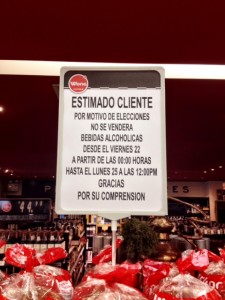Merry Christmas family and friends, I hope you all are enjoying the Christmas season back in the States. I’ll be making a brief visit into Virginia, before our annual Edify meeting and then heading back down to Lima, Peru in early January. I decided to assemble all the events of this past fall into one newsletter instead of sending out monthly updates because it was easier to communicate a summary of the information that was pretty much related over the past few months. It’s now summer here in Peru and schools and university are on their summer break. How strange! Blessings, -Aaron
I moved to Lima, Peru in mid-august to start the Edify program. As you know, over this past year, I had done a feasibility study for Edify in four different Latin-American countries, meeting with 10 different microfinance organizations, visiting almost 70 private schools, and conversing with hundreds of school leaders. Currently Edify works in six countries making small loans to low-cost Christian schools to help them with their construction projects like classrooms and computer labs and provide them business training to improve the school and the quality of education.
 As an organization, we decided to enter Peru based on the like-minded nature of potential Christian microfinance organizations, and the ability to have significant impact with education in an empowering country environment. We wanted to find a country that was safe to do business in, one that was open to the kind of Christian missional work we do in other countries, and one where the economic need was evident. After spending almost two months in Peru in late spring, we felt we had enough information to make the decision on the four countries in the study, and in July, we decided to set up shop in Peru.
As an organization, we decided to enter Peru based on the like-minded nature of potential Christian microfinance organizations, and the ability to have significant impact with education in an empowering country environment. We wanted to find a country that was safe to do business in, one that was open to the kind of Christian missional work we do in other countries, and one where the economic need was evident. After spending almost two months in Peru in late spring, we felt we had enough information to make the decision on the four countries in the study, and in July, we decided to set up shop in Peru.
After spending two years in the Dominican Republic, I felt like I had a good idea of how the Edify program works, and was very excited to open a new country for Edify. Sometimes it feels easy to start something for which you already have a template, and then you realize that bringing this to a new country and a new context requires a lot of patience and a tremendous amount of teamwork to make it happen. It’s interesting to me now to see how missions organizations and non-profits reach 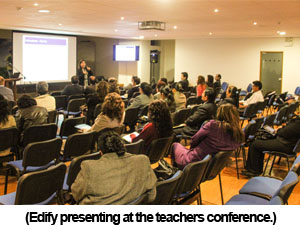 the scale that they do. For example, the largest non-profit in the world, World Vision has 44,500 employees and works in 97 countries. I compare that with setting up this one partnership in Lima, Peru and I think of the monumental work World Vision undertook to reach their current level. I know now first-hand that it takes a lot of introductions, a lot of meetings, phone calls, visits, emails, travel, discussions, contracts, new connections; a whole lot of manual assembly to put the pieces together. That’s been the theme of this past fall: trying to tie it all together.
the scale that they do. For example, the largest non-profit in the world, World Vision has 44,500 employees and works in 97 countries. I compare that with setting up this one partnership in Lima, Peru and I think of the monumental work World Vision undertook to reach their current level. I know now first-hand that it takes a lot of introductions, a lot of meetings, phone calls, visits, emails, travel, discussions, contracts, new connections; a whole lot of manual assembly to put the pieces together. That’s been the theme of this past fall: trying to tie it all together.
It’s been amazing to see how the Lord has been working here Lima, Peru. Early on, I connected with a local Christian organization called “Christian Development of Peru” that offers training and educational resources for Christian schools and pastors throughout Peru. They helped connect me to two different Christian school organizations that in total have 34 schools, and invited us to  participate in their fourth annual teachers conference entitled, “Evaluation and Sustainability for Educational Projects.” On October 29th, we as Edify presented almost three hours of training to leaders from 20 different schools on how to be sustainable as a low-cost Christian school and how to improve local community impact. While we were hoping for closer to 50 schools, it was still a great success to be able to plant our feet here in the community.
participate in their fourth annual teachers conference entitled, “Evaluation and Sustainability for Educational Projects.” On October 29th, we as Edify presented almost three hours of training to leaders from 20 different schools on how to be sustainable as a low-cost Christian school and how to improve local community impact. While we were hoping for closer to 50 schools, it was still a great success to be able to plant our feet here in the community.
We met our facilitator to do our business training through the church I’ve been attending, Camino de Vida, (www.caminodevida.com). I had connected with the pastoral staff and introduced myself and our mission for Peru back in April. As the months progressed, they became instrumental in helping us launch our program here, introducing us to individuals who work in Christian schools, broadcasting, government, and those in the private sector. There is really no other way I would have been able to meet such quality people, without the kindness and hospitality that the Peruvian leaders have shown us over the past few months. As we move closer to doing our first loan here with the 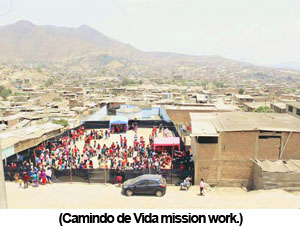 local Microfinance organization, Camino de Vida is waiting to introduce us to even more schools that could benefit from the work of Edify. What a great model for building a new program!
local Microfinance organization, Camino de Vida is waiting to introduce us to even more schools that could benefit from the work of Edify. What a great model for building a new program!
But I’ve been very careful about making personal visits to schools that have invited me to see their school. As you can imagine, it’s incredibly important for the long-term sustainability of our program that we work with local leaders to develop relationships with schools, and second, I don’t want to give off the impression that I’ve come to their school to prepare a huge check for a donation, or am trying to work out the logistics for a big shipment in a few months. That’s not what we do, and indeed, it wouldn’t be good for their overall success. It’s the basic principle of a hand-out or a hand-up. I know they could use any donation, be it monetary or equipment based, but if they keep relying on donations for their operation, they are going to be stuck in that cycle of waiting for the next individual  to walk through the door, and we will soon run out of resources to donate to all the schools we want to work with. It’s important to maintain a consistent message of partnership and sustainability.
to walk through the door, and we will soon run out of resources to donate to all the schools we want to work with. It’s important to maintain a consistent message of partnership and sustainability.
Certainly, one of the worst things I could do is promise something I cannot deliver on. I’ve heard too many stories from school proprietors that told me about Americans who had come to visit two or three years ago, even five or ten years ago, and the people never delivered what they said they were going to do. I remember talking with a friend who spent a few months in Burkina Faso (An economically poor country in West Africa, and a new country for Edify this past year) and he said that “While we all have good intentions to help others, while we may have pure hearts, you have to think about it from their perspective. If you’re the only foreigner they’ve seen and you even hint at  something amazing that they would never in their life be able to afford, they are going to start hoping you’ll deliver, and treating your suggestion as a promise. Don’t break a promise to them.”
something amazing that they would never in their life be able to afford, they are going to start hoping you’ll deliver, and treating your suggestion as a promise. Don’t break a promise to them.”
So as far as our progress is concerned, we’ve been proceeding slowly, patiently, making the right introductions, presentations and building up relationships in the first few months. We want to make sure we do this right. And when we are ready, and when the local organization is ready we’ll be excited to follow-through on what we promised to deliver on. It has been a period of expectation and waiting and a lot of assembly. That’s kind of what this season is about right? Awaiting the promise of something to come. That’s what they were waiting for before Jesus was born 2,000 years ago, and then he arrived in the season prepared for his arrival.
I pray that your Christmas season would be filled with the good and healthy promises, and that you would appreciate family and friends and the arrival of Christ to the world.
Blessings,
-Aaron
![]()
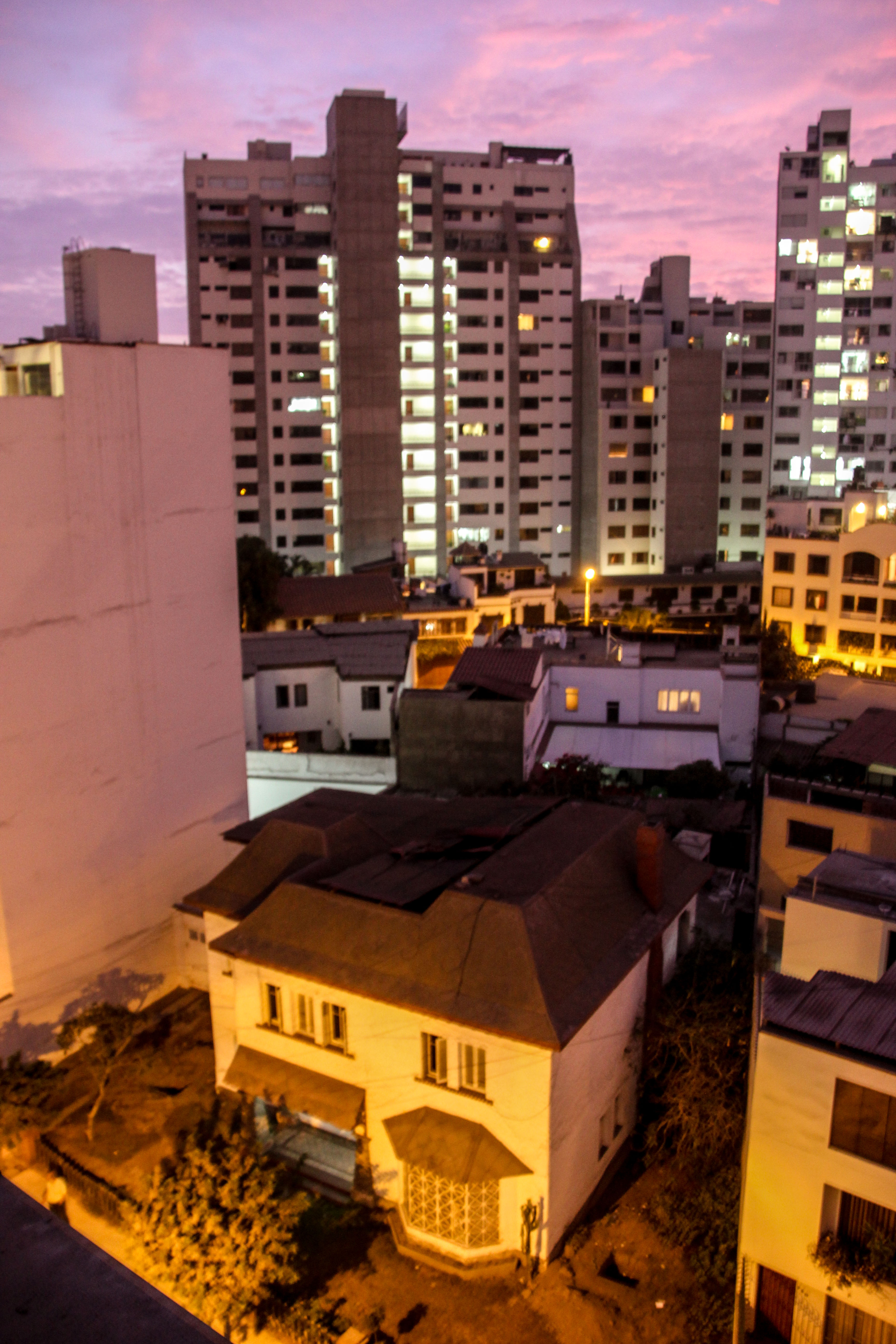 I had a clear view of the house like the one they used in the movie “Up” where I used to live in Miraflores, Lima. I mean look at this house. It’s a spitting image of it there, like a sitting duck amidst its giant neighbors. It was a house from the late 60’s, maybe early 70’s with a classic architecture. If you walk around Miraflores you’ll see some of these houses remaining. They are becoming more rare because of the current trend of building 10 floor apartment or condominium buildings. Some of these property values for the houses can go for over $300,000 and even up to $500,000, my guess is that the sale of a well-located property can fetch up to a few million dollars.
I had a clear view of the house like the one they used in the movie “Up” where I used to live in Miraflores, Lima. I mean look at this house. It’s a spitting image of it there, like a sitting duck amidst its giant neighbors. It was a house from the late 60’s, maybe early 70’s with a classic architecture. If you walk around Miraflores you’ll see some of these houses remaining. They are becoming more rare because of the current trend of building 10 floor apartment or condominium buildings. Some of these property values for the houses can go for over $300,000 and even up to $500,000, my guess is that the sale of a well-located property can fetch up to a few million dollars. When you look at my “Up” house here posted, doesn’t it look so out of place next to the towering apartment buildings next-door? I kept thinking that it was only a matter of time before the owners sold their property, and yet another classic house would succumb to the fate of other well-located houses in dense residential areas. It’s sad to me thinking about the loss of another house because I feel like this district loses more of its charm with every sale of a quaint residence. But if I were the owner, what would I do? Would I do the same?
When you look at my “Up” house here posted, doesn’t it look so out of place next to the towering apartment buildings next-door? I kept thinking that it was only a matter of time before the owners sold their property, and yet another classic house would succumb to the fate of other well-located houses in dense residential areas. It’s sad to me thinking about the loss of another house because I feel like this district loses more of its charm with every sale of a quaint residence. But if I were the owner, what would I do? Would I do the same? and bustle of the burgeoning economy? Or they used the funds to help their children go after their life-long dreams?
and bustle of the burgeoning economy? Or they used the funds to help their children go after their life-long dreams?
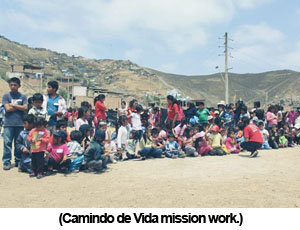 Edify worldwide –
Edify worldwide –  As an organization, we decided to enter Peru based on the like-minded nature of potential Christian microfinance organizations, and the ability to have significant impact with education in an empowering country environment. We wanted to find a country that was safe to do business in, one that was open to the kind of Christian missional work we do in other countries, and one where the economic need was evident. After spending almost two months in Peru in late spring, we felt we had enough information to make the decision on the four countries in the study, and in July, we decided to set up shop in Peru.
As an organization, we decided to enter Peru based on the like-minded nature of potential Christian microfinance organizations, and the ability to have significant impact with education in an empowering country environment. We wanted to find a country that was safe to do business in, one that was open to the kind of Christian missional work we do in other countries, and one where the economic need was evident. After spending almost two months in Peru in late spring, we felt we had enough information to make the decision on the four countries in the study, and in July, we decided to set up shop in Peru. the scale that they do. For example, the largest non-profit in the world, World Vision has 44,500 employees and works in 97 countries. I compare that with setting up this one partnership in Lima, Peru and I think of the monumental work World Vision undertook to reach their current level. I know now first-hand that it takes a lot of introductions, a lot of meetings, phone calls, visits, emails, travel, discussions, contracts, new connections; a whole lot of manual assembly to put the pieces together. That’s been the theme of this past fall: trying to tie it all together.
the scale that they do. For example, the largest non-profit in the world, World Vision has 44,500 employees and works in 97 countries. I compare that with setting up this one partnership in Lima, Peru and I think of the monumental work World Vision undertook to reach their current level. I know now first-hand that it takes a lot of introductions, a lot of meetings, phone calls, visits, emails, travel, discussions, contracts, new connections; a whole lot of manual assembly to put the pieces together. That’s been the theme of this past fall: trying to tie it all together. participate in their fourth annual teachers conference entitled, “Evaluation and Sustainability for Educational Projects.” On October 29th, we as Edify presented almost three hours of training to leaders from 20 different schools on how to be sustainable as a low-cost Christian school and how to improve local community impact. While we were hoping for closer to 50 schools, it was still a great success to be able to plant our feet here in the community.
participate in their fourth annual teachers conference entitled, “Evaluation and Sustainability for Educational Projects.” On October 29th, we as Edify presented almost three hours of training to leaders from 20 different schools on how to be sustainable as a low-cost Christian school and how to improve local community impact. While we were hoping for closer to 50 schools, it was still a great success to be able to plant our feet here in the community. local Microfinance organization, Camino de Vida is waiting to introduce us to even more schools that could benefit from the work of Edify. What a great model for building a new program!
local Microfinance organization, Camino de Vida is waiting to introduce us to even more schools that could benefit from the work of Edify. What a great model for building a new program! to walk through the door, and we will soon run out of resources to donate to all the schools we want to work with. It’s important to maintain a consistent message of partnership and sustainability.
to walk through the door, and we will soon run out of resources to donate to all the schools we want to work with. It’s important to maintain a consistent message of partnership and sustainability. something amazing that they would never in their life be able to afford, they are going to start hoping you’ll deliver, and treating your suggestion as a promise. Don’t break a promise to them.”
something amazing that they would never in their life be able to afford, they are going to start hoping you’ll deliver, and treating your suggestion as a promise. Don’t break a promise to them.”
